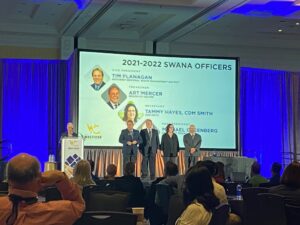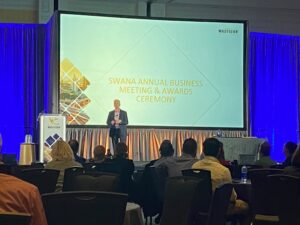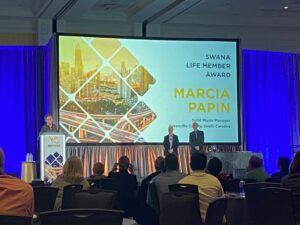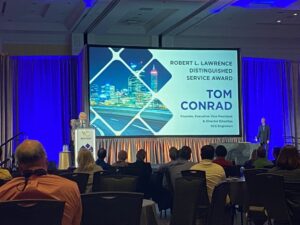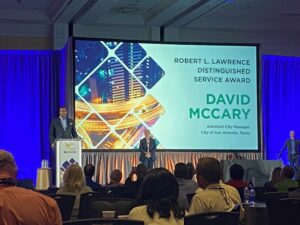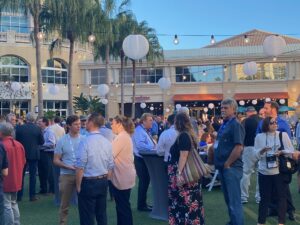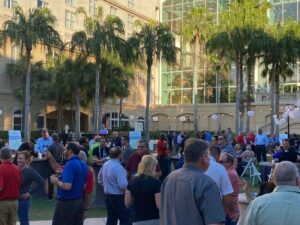Tuesday morning, returning favorite, Rebecca Ryan, a Futurist from Next Generation Consulting, was the first keynote presentation, speaking “From Reactive to Proactive: Using Disruption as a Catalyst for Excellence”. She said that the last time she was at WASTECON, it was pre-COVID and today, stressed that we are not the same people that we were two years ago. It is important that we came back to WASTECON because it is familiar. However, we are different, society is different, people are different. We just experienced a pivotal moment in time that has made a fundamental change in how we live and what we expect, especially with regards to the workforce and employee engagement. Now, we have an opportunity to nest within a purpose driven job. In this mass disruption, people are listening for these signals. Since 2019, the place where you are working has changed, including working more hours, a changing workforce, it has been harder to find employees, need more diversity, how we interact is different, more technology has been used, and there has been less face to face. People now want more flexibility. She asked the audience what is becoming obsolete but trying to maintain itself? Who/what are trying to emerge? What is the narrative happening in your organization, community? Ryan asked attendees to participate in a series of questions that covered how much time spent with spending with peers, tradeoffs, thinking about the future of waste industry, how they spend most of their day, etc. She said many people let the future happen to them. We need to be more proactive than reactive. There is not enough time spent thinking about the future with your teams. You have to be able to let things go that don’t work in order to move forward. As we think about the changes that are occurring in solid waste, it is amazing, but need to take time to think about what is coming and be prepared, otherwise will be left behind. Ensure that you will make the most of this disruption. The future is ours to create.
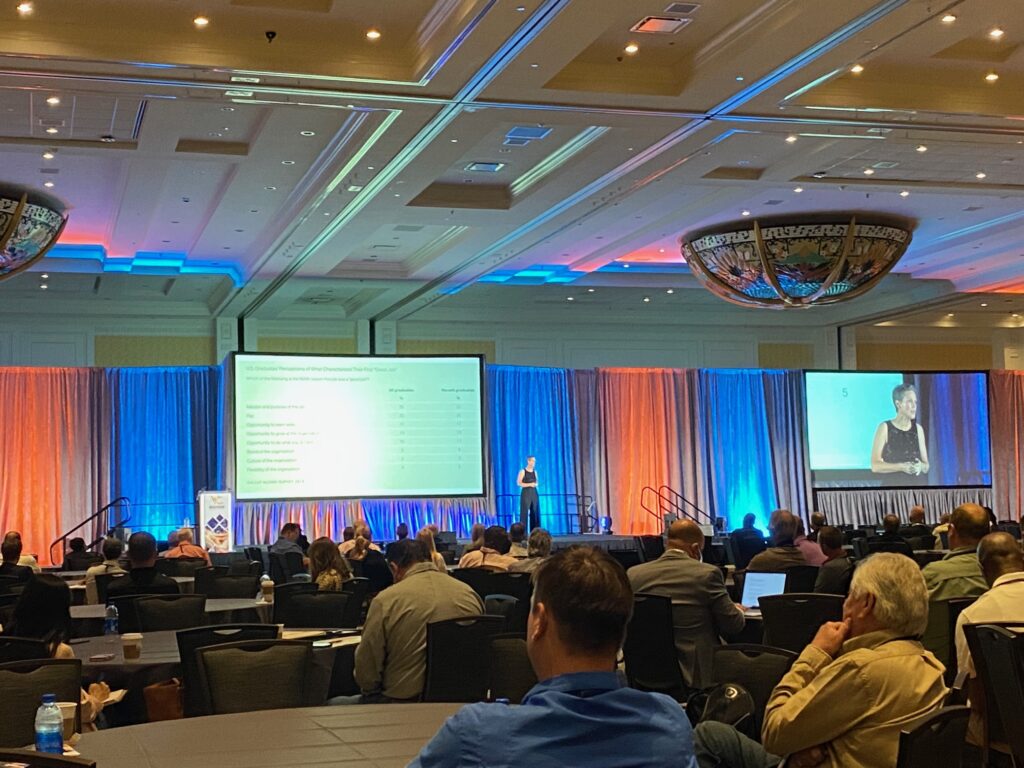
Next Ruben Stokes, a Justice, Equity, Diversity, and Inclusion Expert (JEDI) talked about “Embracing DEI as a Strategic Advantage in 2021 and Beyond”. What does it mean? He stressed that DEI (diversity, equity and inclusion) is a game changing, forward looking business strategy to increase business efficiency (it is not to fix the problems of the past), make employees more engaged, develop new products, etc. Challenges in waste industry today include impact of COVID, changing regulations, changing technology, changing demographics, and more. By focusing on being a JEDI expert, you have the opportunity to harness the force in your organization. Stokes talked about his experiences in the industry and how he has a vested interest. He explained that there has been a lot of misinformation from media and other sources about what DEI is. He stressed that DEI is not politically motivated (not red, blue or purple), not to fix wrongs of the past, it is not an HR program. It is about business results—strategic business imperative—that drives ROI. It is a way to turn challenges into opportunities, contribute to business continuity, innovation, etc. It includes everyone and benefits all in the organization. He said that DEI can have an impact on recruiting and retention. Diversity is all the things that employees bring to work every day, including race, nationality, abilities, etc., inclusion is being able to fully participate and bring their whole selves to work, making people feel included, while equity is fair treatment, access and opportunity while eliminating barriers. Stokes also focused on the steps to get there—courageous conversations create the opportunity to have a learning organization, and the need for inclusive leadership. Traits of inclusive leaders include the need to know yourself and your biases, the need for cultural intelligence, continuously learning and collaborating, need to be committed to success, and the need to be courageous. When you get it right, your organization is going to look different. Senior executive team also needs to model that behavior. Going forward be open minded to differences, recognize biases in your organization.
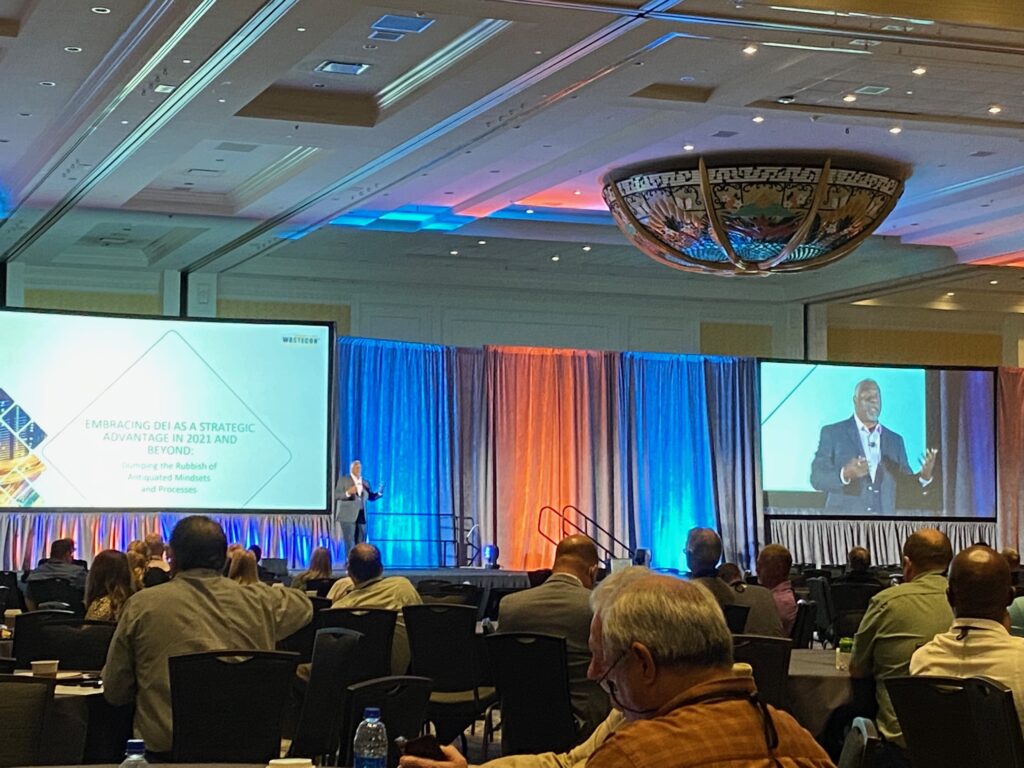
To close out the morning sessions, Jonathan North from Rehrig Pacific spoke on , sustainable and core solutions, as well as the power of collaboration in order to solve problems together for greater purpose. He talked about the company’s sustainable practices and how they found their partners in order to incorporate ocean waste into their carts. He also shared examples of McDonald’s incorporating food waste into their trays, Ikea incorporating wood waste into their chairs, and others who have been successful in incorporating waste into their products. Rehrig Pacific has not only incorporated ocean waste into their cars by they have incorporated consumer recyclables, bulky waste, film shrink and stretch, and sustainable virgin material (sourced using renewable energy and power) into some of their products as well.
Once the morning sessions finished, attendees not only had a chance to visit the exhibit hall and see what the vendors had to offer, but they also had a chance to attend Catalyst Sessions on the show floor featuring Waste Innovations, Underground Refuse Systems, McNeillus, Rubicon, Peterbilt, New Way and others. These special presentations allowed attendees to see first hand how some of today’s technology can help their business be more efficient and streamlined.
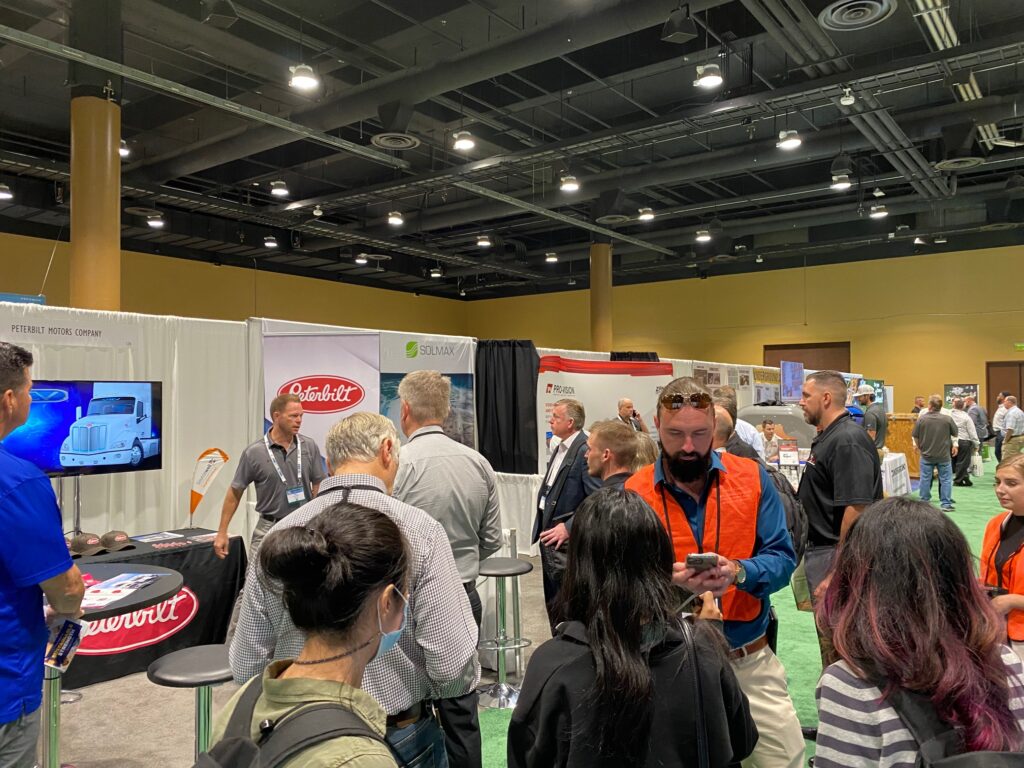
In the afternoon, Safety Summit and Leadership session offered a chance to learn from others what they have done in their organizations to become more safety-focused as well as provide some tips on how to reduce accidents and injuries. Leadership workshops focused on innovative ideas, becoming an inclusive leader, and building up an organization’s personal brand for success.
The last keynote of the day was a “fireside chat” with Patrick Dovigi, Founder, President and CEO of GFL Environmental, who chatted with David Biderman, Executive Director of SWANA, about his experiences in the industry, how he got his start, and what GFL has done to be success over the last several years. Dovigi said that the company’s corporate philosophy is focused on diversion and recycling programs. He stressed that GFL’s regional management teams have allowed the company to be successful because they are empowered to make decisions—think big but act small. He commented that as the company gets bigger, it gets harder, but they have managed to face it head on. They focus on promote from within, finding ways to get employees to stay long term. He stressed that at the end of the day, people leave their bosses rather than their companies. He also explained that they are looking at additional markets to expand into. As far as current trends, he said that the Canadian government is big on focusing on diversion and food waste, what is going in landfill, what is being picked up, etc. He believes that impact of the EPR laws will be an opportunity for the industry to work with packagers to divert waste. He also stressed that safety first has been a focus on from day one. Companies need to create a culture of change in order to move to where we need to be regarding safety. At the end of day, you want people that will give your best to the company—bring them into the culture, recruit from within and partner with community colleges. Important to give back to communities to establish relationships. As the world continues to move on the labor shortage will be less. As far as lessons learned from pandemic, people are resilient and can adapt quickly to change. The industry has shown that, and we do what we must when needed.
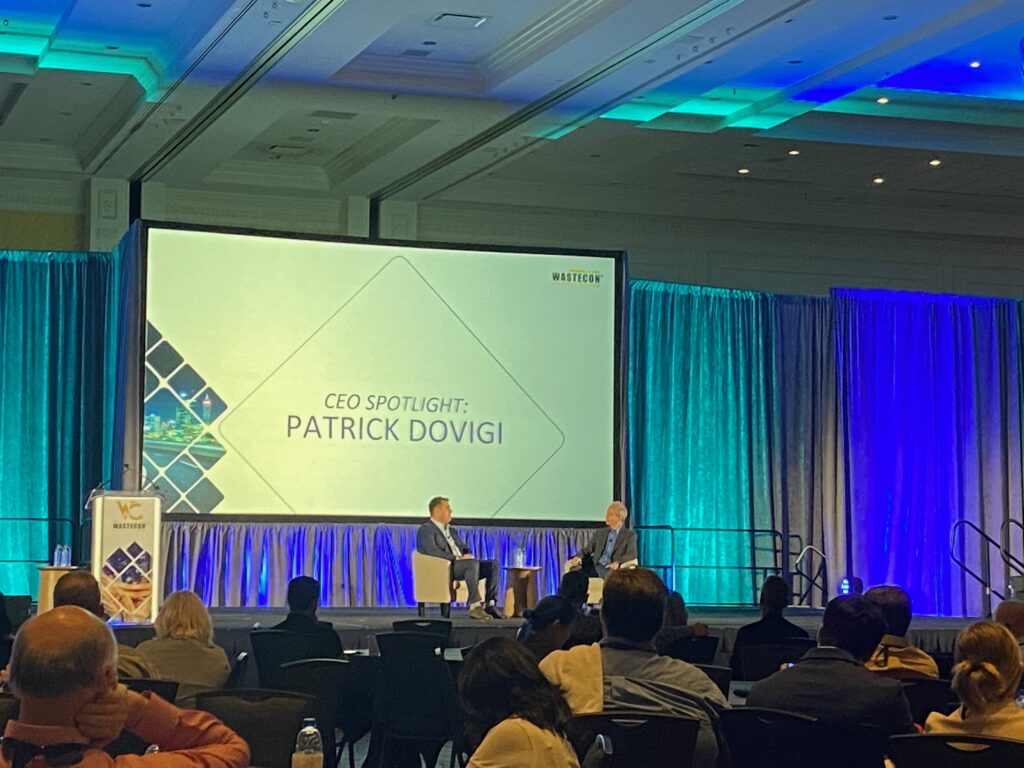
Finally, the last session of the day was SWANA’s Annual Business Meeting and Awards. SWANA President, Brenda Haney, introduced the current SWANA officers. Haney went on to talk about how she learned from this year’s award winners and encouraged attendees to get to know all of them. She spoke about those in the industry that carved a path for others to follow, called out Nancy Nevil–the only other woman from the state of Texas that served in this role. Sarah bixby and Michelle Leonard, part of the Women of Waste, mentored, supported and encouraged her along her journey. Michael Greenberg, one of the best professionals, helped her in the role of president. Haney also gave a special shoutout to staff of SWANA, who have helped to make it the world class organization it has become. She also thanked the City of Lubbock as well as the many others who supported, encouraged, helped and defended along the way. Next she turned to introducing this year’s SWANA award winners, which included:
- Lifetime Achievement Award – Marcia Papin, Solid Waste Manager, Greenville County, SC
- Robert L Lawrence Distinguished Service Award – Tom Conrad, Founder, EVP, and Director Emeritus, SCS Engineers
- Robert L Lawrence Distinguished Service Award – David McCary, Assistant City Manager for the City of San Antonio, TX
- Professional Achievement Award, Public Sector Member – Felipe Moreno, City of Phoenix, AZ
- Professional Achievement Award, Private Sector Member – Constance Hornig, City of Los Angeles, CA, Attorney at Law
- Professional Achievement Award, Private Sector Member – James Skora GT Environmental, Materials Management and Sustainability Business Unit Manager
- Professional Achievement Award – Zachary Hansen, Environmental Health Director, Ramsey County, MN Public Health
- Safety Award Winner, Safety improvement – Waste Connections of Canada Toronto District
- Safety Award Winner, Best Safety Innovation – Atlantic County, NJ Utilities Authority
- Safety Award Winner, Best COVID-19 response – Athens-Clarke County, GA Solid Waste Department
There were just a handful of the 25 award winners this year. Congratulations to all!
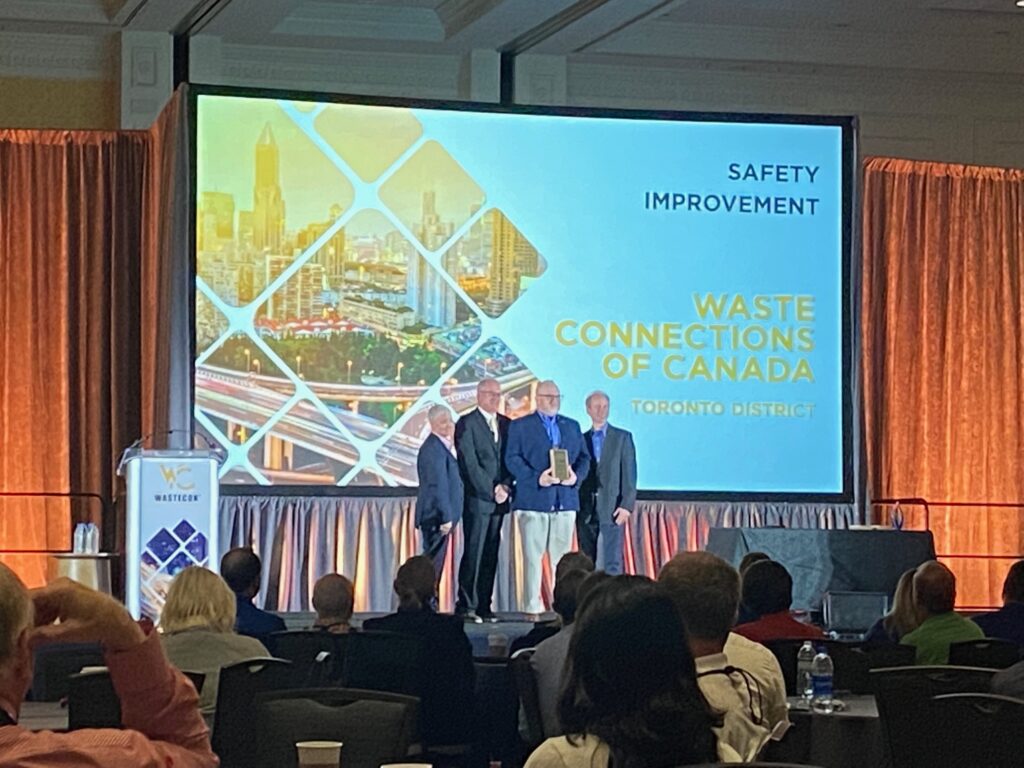
To wrap up the day, SWANA’s Networking Reception offered attendees a place to relax and hang out, spend some time with old friends and meet new people. It was a great opportunity to get to know one another and provided a great venue after a busy day.
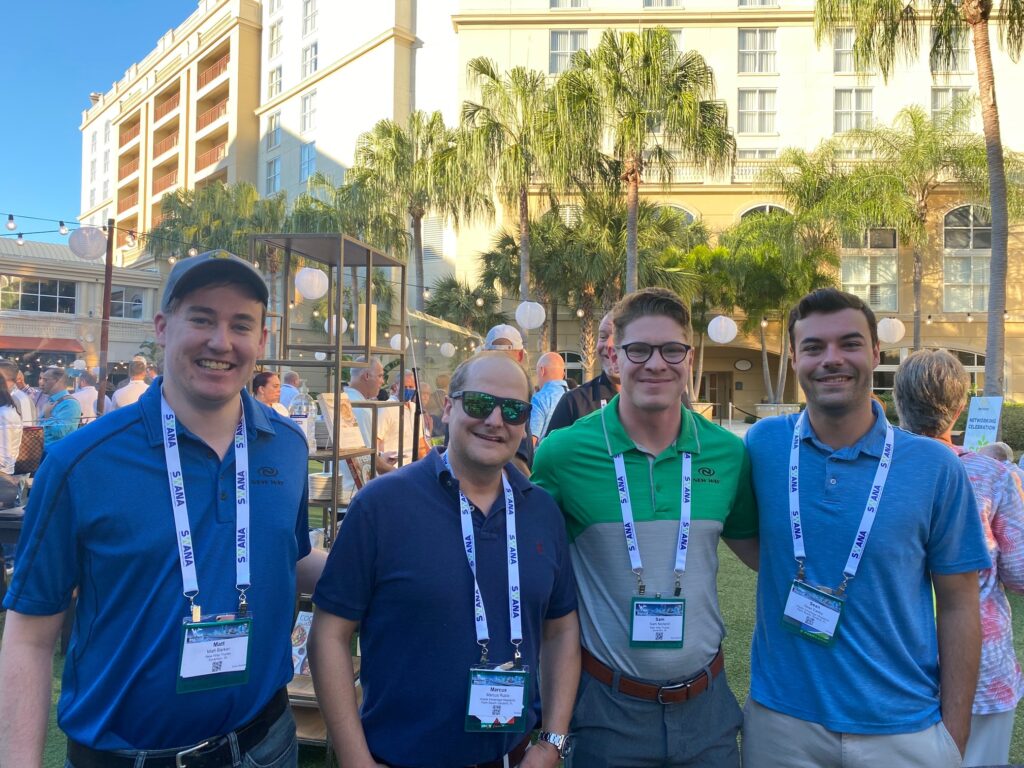
We look forward to seeing the keynotes, exhibits, events and more going on tomorrow. Be sure to stop by and see Waste Advantage Magazine at Booth #333. We’d love to chat with you!
For more information, visit wastecon.org.
